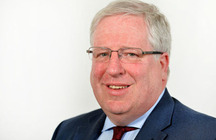
Below is the text of the speech made by Patrick McLoughlin, the Secretary of State for Transport, at the ExCel centre in London on 28 June 2016.
Introduction
Thank you for having me here today.
Everyone in this room knows these are unpredictable times.
So it’s nice to be able to get back to the hard certainties of concrete and steel.
And it’s encouraging that so many have come here to discuss exactly those things.
European referendum
Now, I want to address the events of the last week directly.
I passionately wanted Britain to remain part of the European Union.
But the people of the United Kingdom delivered their verdict.
Now the entire government and I will work to deliver their instruction.
Yes, we face a period of adjustment; economic, social and political.
But as we step out into our new place in the world, I sincerely believe we do so from a position of strength.
We have spent the last 6 years delivering a plan that today means Britain is the strongest major advanced economy in the world.
Employment is at a record high.
Growth has been robust.
And the fundamentals of our economy are strong.
Many of you in this room have helped make it so.
Together we’ve got Network Rail’s (NR) orange army improving our railway tracks.
And we’ve rebuilt those key hubs such as Birmingham New Street and Manchester Victoria, to improve the daily commute.
Together we’ve delivered dozens of major road improvement projects, to give our roads the capacity to handle future growth.
And we are working on dozens more.
Together we’re nearly at the finishing line on Crossrail, which will transform London’s rail network and link our largest airport with our largest financial district.
So it’s thanks to your efforts that we enjoy some of the best infrastructure of any developed nation.
It means we have the best possible tools to tackle the challenges ahead.
And as we face up to the enormity of our task, be reassured.
Our work is not yet done.
The business of strengthening Britain’s economy continues.
HS2 will rebalance our economy and generate colossal benefits for the supply chain.
As the National Audit Office confirmed today, this project is on track.
We are making progress on HS3, or Northern Powerhouse Rail, which will transform the north, alongside the £13 billion we are spending improving transport in the area.
We are transforming northern roads, and electrifying northern railways.
The first ever Road Investment Strategy will shortly be backed up by a second, delivering the largest spend on our roads for a generation.
And on the railways, we have the most ambitious rail plan since the Victorian era.
We are electrifying over 850 miles of railway, and delivering a better service for passengers through a franchising system that is reaching maturity.
Altogether, transport spending will rise by 50% in this parliament.
Because those who control the budgets know exactly how vital this programme is.
And as we address the future and the consequences of our vote to leave the European Union (EU), one thing is certain.
Investment in the long term infrastructure we need, has become more important, not less.
Passenger demand is increasing; we are making twice as many journeys as we did in 1970.
And so is the demand for economic growth.
Let me give you two examples.
One from the beginning of the last government, and one that struck me this week.
In 2010, one of the first decisions that landed on George Osborne’s desk was the recommendation that he cancel Crossrail.
The argument was clear:
Our economy is in crisis and Crossrail will cost billions
Thank goodness the Chancellor saw it differently.
Yes, we could have used the Crossrail funding to pay down our debt.
But diverting that investment would only create new problems down the line.
The economic boost and extra capacity that Crossrail is bringing is badly needed.
And backing out would’ve shown the short-termism that got us into an economic mess in the first place.
Now no one’s arguing that we shouldn’t have done it.
Even the Public Accounts Committee has called it:
A textbook example of how to get things right
The case for Crossrail that we came across in 2010 is the same case for new infrastructure now.
Yesterday we formally opened a new station at Kirkstall Forge in Leeds.
It’s the second new station we’ve opened in and around Leeds in recent months.
Kirkstall Forge station cost the government less than £10 million to build.
But it’s the catalyst for a £400 million investment in the area by the private sector, leading directly to a thousand new homes and a world-class new business park.
There are countless examples of investment like this across our country.
And be certain: the investment will continue.
Yet there are also important questions ahead for the UK, as well as big opportunities.
Take aviation capacity in the South East.
We remain committed to expansion.
And we remain committed to delivering runway capacity on the timetable set out by Sir Howard Davies.
This remains one of the most important decisions for the government to take.
All sides will have their views.
Mine is this: as we make decisions about our future in the coming weeks and months, it is vital that the UK is seen to be open for business and building the infrastructure it needs to compete.
So yes, there are things we don’t yet know the answer to.
Things still to work through.
But the instructions we received from the British people were clear.
And as we deliver those instructions we proceed with confidence.
Confidence that our infrastructure is fit for the future.
That our economy is fundamentally strong.
And that business and government will pull together to deliver the best for Britain.
It’s a winning formula.
And it means that Britain is ready for the challenges of the future.
Thank you.